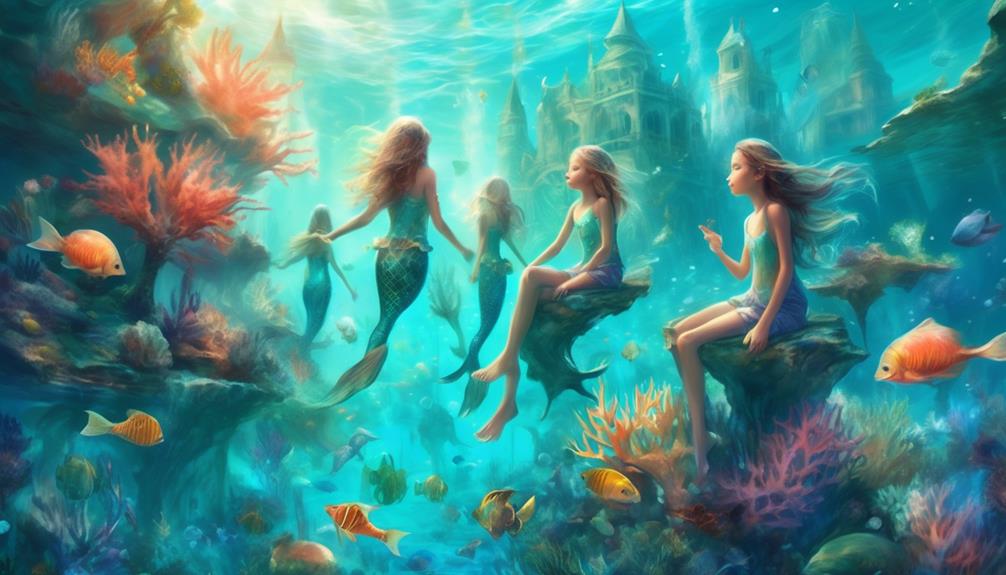Exploring the depths of the ocean can be an enchanting experience, but what if there were guides who could offer unique insights into the secrets of the sea?
Mermaids, often associated with folklore and fantasy, possess a deep understanding of marine life and its wonders.
Delving into the 10 best sea life lessons with these mythical guides can unveil a whole new perspective on the ocean and its inhabitants.
From uncovering the magic of coral reefs to embracing a mermaid's call for ocean stewardship, these lessons offer a captivating journey into the underwater world, providing valuable knowledge and awareness.
Key Takeaways
- Coral reefs and marine biodiversity are important for maintaining ecosystem health and providing resources for humans.
- Conservation efforts are crucial for protecting and restoring reefs, as well as preserving marine biodiversity.
- Understanding the interconnectedness of ocean ecosystems and the behavior of marine species helps in conservation and sustainable management.
- Addressing ocean pollution, including plastic pollution, and promoting sustainable fishing practices are essential for the long-term health of marine environments.
The Magical World of Coral Reefs
The coral reef ecosystem teems with a diverse array of marine life, intricately intertwined and finely balanced within the vibrant underwater landscape. Exploring underwater wonders reveals a complex web of relationships, where each organism plays a crucial role in maintaining the health of the reef.
Coral reef conservation is paramount, as these delicate ecosystems face numerous threats, including overfishing, pollution, and climate change. Conservation efforts focus on protecting and restoring these vital habitats, as they provide food and shelter for countless species, support local economies through tourism, and even offer potential sources for new medicines.
Understanding the interconnected nature of coral reefs underscores the importance of preserving these underwater wonders for future generations to appreciate and learn from. The intricate balance of life within coral reefs serves as a valuable lesson in the fragility and resilience of ecosystems.
Understanding Marine Biodiversity
Exploring the intricate web of relationships within coral reef ecosystems provides valuable insights into the diverse marine life and the interconnected nature of marine biodiversity.
Coral reefs, often referred to as the 'rainforests of the sea,' are hotspots of marine biodiversity, supporting an array of species. Understanding marine biodiversity is crucial for marine conservation efforts, as it helps in comprehending the complex relationships and dependencies within oceanic habitats.
The variety of species within these habitats contributes to ecosystem stability and resilience. By studying marine biodiversity, scientists can identify key species, understand their roles in the ecosystem, and develop strategies for the conservation and sustainable management of oceanic habitats.
This knowledge is essential for preserving the delicate balance of marine ecosystems and ensuring the survival of diverse marine life forms.
Secrets of Ocean Ecosystems
Amidst the intricate depths of the ocean, a complex tapestry of interactions and dependencies shapes the secrets of ocean ecosystems.
Coral restoration plays a pivotal role in maintaining the delicate balance of these ecosystems. Coral reefs support an abundance of marine life and protect coastlines from erosion and storms. However, they're under threat from climate change, overfishing, and pollution.
Efforts in coral restoration aim to rehabilitate these vital ecosystems by growing and transplanting corals.
Additionally, deep sea exploration has unveiled the mysteries of the ocean's abyssal plains, hydrothermal vents, and diverse marine life that thrive in extreme conditions. These explorations provide valuable insights into the interconnectedness of ocean ecosystems and the importance of preserving their delicate balance for the well-being of the planet.
Importance of Sea Turtle Conservation
Observing the migratory patterns and nesting behaviors of sea turtles provides critical insights into their conservation needs and the health of marine ecosystems.
Sea turtle nesting sites are threatened by various factors, including the presence of marine debris. Plastic pollution, discarded fishing gear, and other debris pose significant dangers to sea turtles as they can become entangled or mistake it for food. This can result in injury or death, impacting the population's reproductive success.
Conservation efforts are essential to mitigate these risks and ensure the preservation of sea turtle habitats. By addressing marine debris and protecting nesting sites, conservationists can help sustain sea turtle populations and contribute to the overall health of marine ecosystems.
Understanding these conservation needs is crucial for the long-term well-being of these ancient and majestic creatures.
Exploring Shark Behavior and Ecology
The behavior and ecology of sharks provide valuable insights into their role as top predators within marine ecosystems.
Shark communication and predation patterns are crucial aspects of their behavior. Sharks use body language, postures, and chemical signals to communicate with each other, aiding in group hunting and mating behaviors. Understanding these communication signals is vital for shark conservation and management.
Additionally, studying shark predation helps in comprehending their impact on prey populations and maintaining the balance of the marine food web. Conservation efforts often focus on regulating fishing practices, establishing protected areas, and minimizing human-shark conflicts.
Effective management strategies consider the ecological role of sharks to ensure the sustainability of marine ecosystems. By delving into the intricacies of shark behavior and ecology, researchers can better inform conservation measures and safeguard these apex predators.
Protecting Endangered Marine Species
Efforts to conserve endangered marine species are imperative for maintaining the biodiversity and ecological balance of the world's oceans. Protecting these species is crucial for the overall health of the marine habitat.
Human activities such as overfishing, pollution, and habitat destruction have led to a significant decline in the populations of various marine species. Conservation efforts play a vital role in preventing further loss.
Measures such as creating marine protected areas, implementing sustainable fishing practices, and reducing plastic pollution are essential for species preservation. Additionally, raising awareness about the importance of these species in their ecosystems is crucial for garnering public support and involvement in conservation efforts.
Learning About Sustainable Fishing Practices
One must understand the principles of sustainable fishing practices to ensure the long-term viability of marine ecosystems. Sustainable fishing methods aim to minimize environmental impact, preserve marine life, and support responsible seafood consumption for ocean sustainability.
These methods include setting catch limits, using selective fishing gear to reduce bycatch, and avoiding fishing in sensitive areas. By implementing science-based management strategies, such as seasonal closures and marine protected areas, fisheries can allow fish populations to replenish and maintain healthy ecosystems.
Additionally, consumer awareness and support for sustainable fishing practices play a crucial role in promoting the long-term health of marine environments. Understanding the impact of fishing practices on marine life and advocating for sustainable fishing methods are essential steps in safeguarding the oceans for future generations.
Navigating Ocean Pollution Solutions requires a comprehensive understanding of the impact of human activities on marine ecosystems and the development of effective mitigation strategies.
Plastic pollution poses a significant threat to ocean health, with an estimated 8 million tons of plastic entering the ocean annually. To address this, ocean cleanup initiatives have gained momentum, employing innovative technologies such as floating barriers and autonomous drones to remove plastic debris from the water.
Additionally, reducing single-use plastic consumption and improving waste management are essential components of tackling plastic pollution.
It's crucial to monitor and assess the effectiveness of these cleanup efforts, as well as to continue researching and implementing new solutions to prevent further harm to marine life and ecosystems.
The collaborative efforts of governments, industries, and communities worldwide are vital in safeguarding the oceans from the detrimental effects of plastic pollution.
Harnessing the Power of Ocean Renewable Energy
Harnessing ocean renewable energy involves deploying various technologies to capture and convert the natural power of ocean waves, tides, and currents into usable electricity.
Wave energy is captured using devices that harness the kinetic and potential energy of waves. These devices include oscillating water columns, point absorbers, and attenuators, which convert the up and down or back and forth motion of waves into electricity.
Tidal power, on the other hand, is generated by exploiting the kinetic energy of the ebb and flow of tides. This is typically achieved using tidal stream generators or tidal barrages, which utilize the movement of water to turn turbines and generate electricity.
These methods are increasingly being explored as sustainable alternatives to traditional fossil fuel-based energy generation.
Embracing a Mermaid's Call for Ocean Stewardship
Embracing a mermaid's call for ocean stewardship requires a deep understanding of marine ecosystems and a commitment to sustainable practices that preserve the delicate balance of ocean life.
Ocean mindfulness, rooted in mermaid mythology, emphasizes the interconnectedness of all marine life and the need for responsible stewardship. This involves actively engaging in efforts to reduce plastic pollution, overfishing, and habitat destruction. It also necessitates promoting conservation initiatives and supporting marine protected areas.
Embracing a mermaid's call for ocean stewardship involves advocating for policies that prioritize the health of ocean ecosystems and participating in beach clean-ups and educational outreach.
Frequently Asked Questions
How Can I Become a Certified Mermaid Guide?
To become a certified mermaid guide, one can undergo mermaid training and certification programs offered by reputable organizations. Job opportunities and earnings for certified mermaid guides can vary depending on location and demand for their unique skill set.
What Are the Best Locations to Swim With Mermaid Guides?
Top locations for mermaid encounters include crystal-clear waters of the Bahamas, the vibrant coral reefs of Hawaii, and the diverse marine life of the Great Barrier Reef in Australia. These locations offer unparalleled experiences with mermaid guides.
Do Mermaids Have Specific Diet and Exercise Routines to Maintain Their Underwater Abilities?
Mermaids maintain their underwater abilities through specialized nutrition and aquatic fitness routines. Underwater nutrition focuses on a diet rich in sea greens and proteins, while aquatic fitness incorporates swimming, water resistance exercises, and breath control techniques.
Can Mermaid Guides Communicate With Other Sea Creatures?
Mermaid guides, as mythological creatures, are said to possess telepathic abilities to communicate with marine life. From a scientific perspective, such claims are rooted in the field of marine biology and the study of underwater communication.
Are There Any Risks or Dangers Associated With Swimming Alongside Mermaid Guides?
Swimming alongside mermaid guides poses potential risks and underwater dangers. Precautions and safety measures should be observed to establish interaction boundaries. Understanding communication methods and respecting the environment are crucial for a safe experience.

